We are witnessing a transformative period in healthcare driven by the rapid integration of digital technologies, including Artificial Intelligence and Machine Learning (AI/ML). The future of advancements in healthcare hinges on comprehensive reimbursement policies that support the adoption of innovative, FDA-regulated digital health technologies. These technologies, as defined by the FDA, utilize computing platforms, connectivity, software, and sensors for various healthcare applications.

Digital health encompasses technologies intended for use as medical devices (such as Software as a Medicare Device), within medical products, as companion diagnostics, or as adjuncts to other medical products.
To ensure wider access to the benefits of digital health, it’s essential to establish clear guidelines. These guidelines should address key aspects critical to supporting the growth and adoption of these technologies.
The principles should center on the following:
- Timely and Adequate Reimbursement: Establishing clear and consistent payment pathways for digital health technologies is crucial. This ensures that providers can effectively utilize and integrate these tools without financial barriers.
- Coverage that Reflects Value: Coverage decisions should be based on the clinical and economic value provided by the technology, supporting the use of innovative solutions that improve patient outcomes and/or reduce overall healthcare costs.
- Data Privacy and Security: Robust data privacy and security frameworks are required to build trust and safeguard sensitive patient information. Compliance with regulations like HIPAA is paramount.
- Interoperability and Integration: Promoting interoperability allows digital health technologies to communicate and share data seamlessly with existing health IT infrastructure. This creates more comprehensive and patient-centered care.
- Focus on Innovation: Encourage innovation by creating an environment that supports rapid technological advancements and the development of new digital health solutions.
- Education and Training for Providers and Patients: Ensuring that both healthcare providers and patients are well-versed in the use and advantages of digital health technologies is essential for successful implementation and sustained utilization.
By embracing these principles, the healthcare industry can work together to enhance patient outcomes, streamline healthcare delivery, and advance its digital capabilities.


